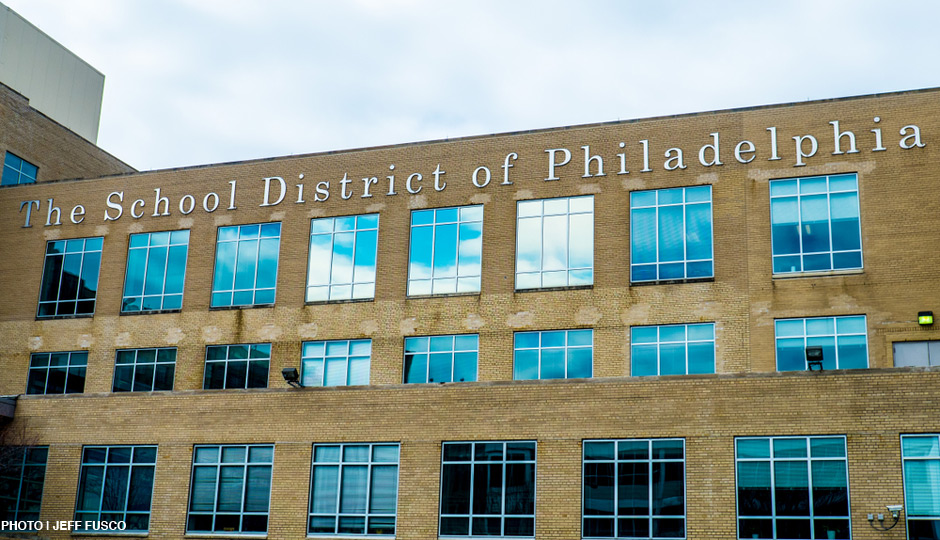Kristen Forbriger is public affairs director at the Philadelphia School Partnership and executive committee member of PhillyCORE Leaders. Follow her on Twitter @kforbriger.
A Plea to the SRC: Evaluate Each School on Its Individual Merits

(Editor’s note: This is an opinion column from a Citified insider.)
At Philadelphia Performing Arts Charter School in South Philly, students are offered majors in music and visual arts and every kid participates in ballet weekly. About half of its student body is middle class and white. At the other end of Broad Street, in North Philly, at the Multi-Cultural Academy charter school, there is no ballet. By design, there are very few extracurriculars available at all. The school’s model is “no-nonsense, academics-focused.” The student body is nearly all black and about 80 percent of the students are low-income.
These two schools could hardly be more different. Yet they are often lumped together—with 84 other schools in Philadelphia—for a simple reason: they are both charter schools. We could just as easily do the same exercise with district schools (how much do Masterman and Bartram have in common?). This is why I can’t make sense of the labels “pro-charter” or “pro-district” (for the record, I am pro-good school).
This is also why I hate sentences that start “charter schools are_______” or “district schools are_______.” Almost any word or phrase used to fill in the blanks can be proven untrue. Let’s test a few popular maxims.
Charter schools cream the best students while District have to school serve all students. Some charter schools have gone out of their way to engineer the makeup of their student body. But many other charter schools make it their mission to serve student populations who have historically been underserved by the School District. While some charters have shady enrollment practices, others go to lengths to ensure the school is open to all students. While it’s true that most traditional public schools are open to all students, many exclude students through their admissions policies—in the case of magnets—or through the neighborhood boundaries that price most families out. Let me put it this way: it would cost a lot more to buy my way into the Greenfield or Meredith catchment area than any charter school in Philadelphia. Let’s focus on improving enrollment practices across the board.
Charter schools are corrupt and just want to make money. Several local charter leaders have abused their autonomy, committed fraud and used their schools for personal gains. Obviously, this is dead wrong for lots of reasons. Yet for every school that has been accused of illegal activity, there are two others with stand-up records and no profit motives that serve as national models for success. Charter scandals are a result of poor authorization procedures and oversight, not proof that the charter model is unworkable. And traditional school districts face some of these same problems. Let’s stop faulting great schools for the wrongdoings of others.
Charter schools are great schools or a “silver bullet.” This is obviously not true. The facts are pretty clear. If the data shows anything at all, it’s that the debate about which is “better” academically—charter or district—is the wrong debate. Looking at the state’s performance scores, some charter schools are excellent and some are pretty bad; the same goes for district schools. The average performance of a sector is a completely useless metric in almost every single way. Let’s all agree to stop using it and assess the quality of each school individually.
There are some important exceptions to this rule. It’s true that district schools are under-resourced. The same can be said of charter schools. (The most frustrating myth among anyone who works or has worked in a charter school is that all charters are flush with cash.)
We need more money for our all our public schools and opening new schools is not going to ease that strain. But when the SRC votes tomorrow on 39 applications for new charter schools, the commissioners should evaluate each application and weigh the merits of opening each individual school. This much is owed to the students, families and educators who simultaneously want nothing more than to receive and provide a great education.
In the coming months, public officials and politicians will begin the annual rite of flipping couch cushions and pleading with purse-holders to find more money for all our public schools. One big step in the right direction would be for the SRC to more aggresively close low-performing charter schools. If a charter school is not providing a quality education, then it does nothing but serve as valuable proof points for charter critics. And personally, I am really tired of getting cornered into defending them.